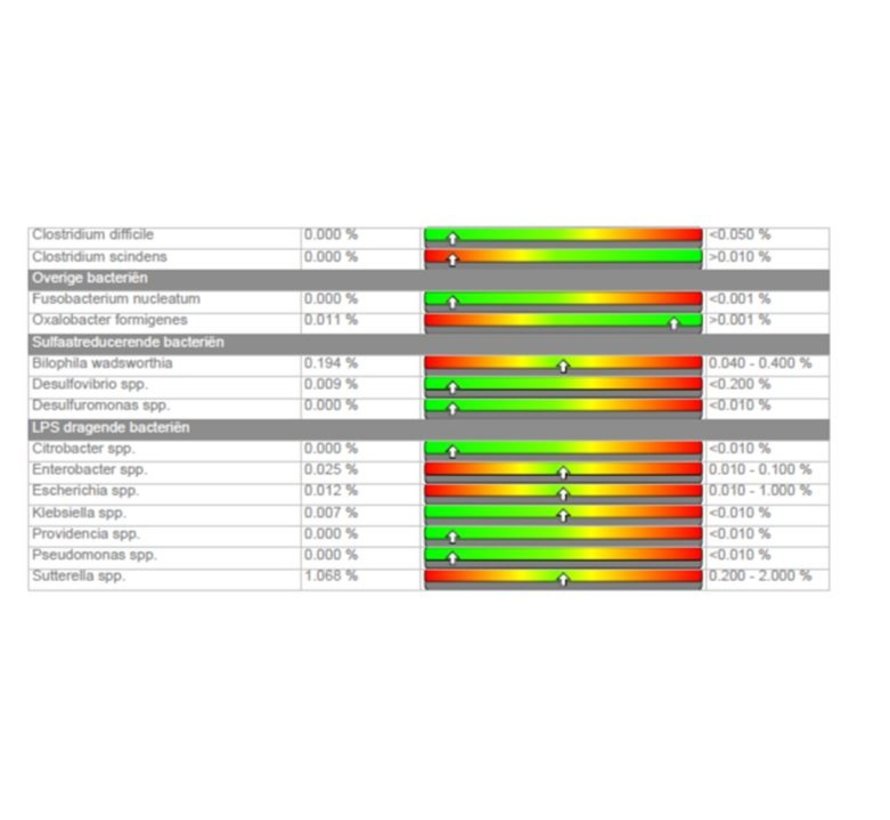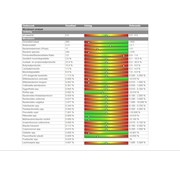Microbiome Intestinal flora RP
With the Microbiome Analysis the biodiversity of the intestinal biota is determined. This is a stool examination.
Examining Your Gut Health
RP Sanitas Humanus offers a special stool test that allows us to look at the bacteria in your gut. You've probably heard that your gut is important to your health, and that's true. They play a major role in protecting against infections, digesting food, absorbing important nutrients and even in the functioning of your immune system.
Protection against Diseases
Bacteria in your gut protect your body from harmful infections. Some bacteria in your gut keep pathogens such as Salmonella and other harmful bacteria from getting a chance.
Food Digestion and Nutrients
Your gut bacteria also play an important role in digesting food. They help break down food particles and produce substances your body needs, such as short-chain fatty acids. These substances provide your body with energy and are good for your gut health.
Firm Relief
Certain bacteria in your intestines can affect the consistency of your stool. Some bacteria make methane, which can lead to firm stools, while other bacteria make for softer stools.
Strengthen Immune System
Your gut bacteria can also boost your immune system. They teach your body how to deal with different types of pathogens and help protect against inflammation and colon cancer.
Diversity of Bacteria
A diverse group of bacteria in your gut is important for a healthy gut. The more diverse types of bacteria you have, the better your gut can function. If you have a lack of diverse bacteria, you are more likely to get infections.
Our research allows us to map almost all known types of gut bacteria. This gives you a better understanding of your gut health and how these bacteria help your body. It can help you make healthy food and lifestyle choices.
Enterotypes
80% of the intestinal flora of the colon is formed by 3 species of bacteria, the Bacteroides, Prevotella and Ruminococcus species. Research shows that, despite enormous variation in the exact composition, one of these species is dominant in every person. We call this the Enterotype:
- Enterotype 1: the Bacteroides dominance, is more commonly seen in obesity.
Type 1 is characterized by a dominance of Bacteroides, which produce butyric acid through fermentation processes. This type is associated with a diet rich in animal proteins and fats. This type is most common in the Western population. - Enterotype 2: Prevotella dominance, is more common in intestinal diseases.
In type 2, the species dominates Pervotella, which plays a major role in the breakdown of glycoprotein in the intestinal mucosa. This type is found in populations that consume a higher proportion of carbohydrates and fast sugars. - Enterotype 3: is characterized by Ruminococcus dominance and is the most common.
The bacteria in type 3 consist mainly of Ruminococcus species, which breaks down mucin, part of the protective mucus layer in the gut, using a carbohydrate present in the gut via food. The intestines can then absorb the debris into the body as nutrients. In type 3, a relatively high proportion of methane-producing bacteria is found.
The bacterial flora characterizing the enterotype is very stable in composition. Research shows that a multi-day highly abnormal diet shows no substantial change on the enterotype. The enterotype is also not affected by BMI or age.
So it is a kind of DNA of your intestines.
What is measured in the test Microbiome :
Diversity overall
Biodiversity
Acteria strains (Phyla)
- Actinobacteria
- Bacteroidetes
- Firmicutes
- Fusobacteria
- Proteobacteria
Bacterial species (Bacteriespecies).
- Alistipes spp.
- Akkermansia muciniphila
- Anaerotruncus colihominis
- Aspergillus fumigatus
- Aspergillus niger
- Bacteroides spp.
- Bacteroides thetaiotaomicron
- Bacteroides uniformis
- Bacteroides vulgatus
- Bifidobacterium adolescentis
- Bifidobacterium animalis
- Bifidobacterium longum
- Blautia hansenii
- Butyrivibrio crossotus
- Candida albicans
- Candida spp.
- Citrobacter spp.
- Collinsella aerofaciens
- Coprococcus spp.
- Cyanobacteria
- Desulfobacter spp.
- Desulfovibrio piger
- Dialister spp.
- Dorea spp.
- Eggerthella spp.
- Enterobacter spp.
- Enterococcus spp.
- Escherichia coli
- Faecalibacterium prausnitzii
- Firmicutes
- Flavonifractor plautii
- Fusibacter spp.
- Fusobacterium nucieatum
- Fusobacterium spp.
- Geotrichum candidum
- Hafnia alveii
- Lachnospira spp.
- Lactobacillus spp.
- Lactococcus spp.
- Methanobacteria
- Methanobrevibacter spp.
- Methanobrevibacter smithii
- Methane-forming bacteria
- Mucinogenic bacteria
- Odoribacter spp.
- Oscillibacter spp.
- Oscillospira spp.
- Parabacteroides spp.
- Prevotella copri
- Prevotella spp.
- Prevotella spp./Bacteriodes - Ratio
- Proteobacteria
- Pseudomonas spp.
- Providencia spp.
- Quotient mucindegradation
- Roseburia spp.
- Ruminococcus spp.
- Sulfate-reducing bacteria
Other
- Acetate and propionate production
- Acetate-/Propionate-forming bact.
- Butyrate production
- Butyrate-forming bacteria
- Cyanobacteria
- Dialister spp.
- Escherichia spp.
- Eubacterium spp.
- Lactate production
- Lactate-forming/saccarolytic bact.
- LPS bearing bacteria
- LPS-bearing bacteria
In the context of microbiology and taxonomy, "spp" stands for "species" in the plural. It is used to refer to different species (species) within a particular genus. So when you see "spp," it means it refers to multiple species within that genus. Here is an example:
Bacteroides spp.: This means "multiple species of the genus Bacteroides." It indicates that several individual species within the genus Bacteroides are meant, but the specific species are not specified.






